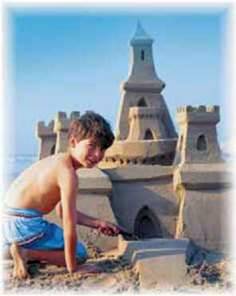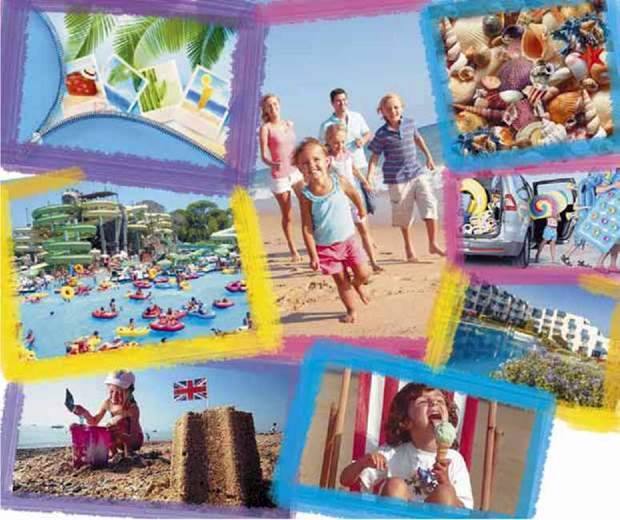AT THE SEASIDE
READ FOR PLEASURE
TEXT 7 AT THE SEASIDE
1. Read the text.
In summer Pavlo usually goes to the seaside with his family. He goes to the beach every day. He watches the sea, the boats and the ships. He sometimes sits on the sand and makes nice sandcastles.
He makes the walls, small towers*, windows and doors. The boy’s sandcastles are always different.
Pavlo likes to swim in the sea. The water is cool!
2. Choose and say.
1. In summer Pavlo usually goes to the seaside with his… .
A friends B classmates C family
2. He goes to the beach and watches. .
A the sea, the sand and the birds
B the beach, the people and sky C the sea, the boats and the ships
3. The boy sometimes makes. .
A doll houses B sandcastles C toys
4. Pavlo likes. in the sea.
A to swim B to jump C to run

* towers – вежі
3. Answer the
1. Where does Pavlo go in summer?
2. What does he do on the beach?
3. Are his sandcastles nice?
4. Does the boy like to swim in the sea? Why?
4. Look at the photos.
Talk about your summer holidays at the seaside. When do you go to the seaside?
What do you usually do there?

Grammar Lab
This is a book. | These are books. |
This book is interesting. | These books are interesting. |
That is a bag. | Those are bags. |
That bag is big. | Those bags are big. |
There is / There are
+ | – | ? | Answers | |||
Long Form | Short Form | Long Form | Short Form | |||
Singular | There | There’s | There is not | There Isn’t | Is there? | Yes, there is. No, there isn’t. |
Plular | There Are | There are not | There Aren’t | Are there? | Yes, There Are. No, there aren’t. |
Prepositions
– in the kitchen, in London | |
– in the book | |
In | – in the car, in the taxi |
– in the picture | |
– in summer (autumn, winter) | |
At | – at the door, at the station – at the table – at the concert, at the party – at the cinema, at school, at work – at night – at 5 o’clock |
On | – on the wall – on the table – on the left / right – on the first floor – on TV, on the radio – on Monday |
By / next to / beside | Her bike is by / next to / beside the car. |
Under | The bag is under the table. |
Above | The picture is above the sofa. |
Possessives
Personal pronouns | Possessive adjectives |
1 | My |
You | Your |
He | His |
She | Her |
It | Its |
We | Our |
You | Your |
They | Their |
Possessives
Nouns (Who?) | Possessives (Whose?) | |
Singular | A boy | Boy’s |
A father | Father’s | |
Mary | Mary’s | |
Chris | Chris’s (Chris’) | |
Plural | Boys | Boys’ |
Parents | Parents’ | |
Children | Children’s |
Present Simple “to be” (am / is / are)
+ | – | ? | ||
Long form | Short form | Long form | Short form | |
I am | I’m | I am not | I’m not | Am I? |
You are | You’re | You are not | You aren’t | Are you? |
He is | He’s | He is not | He isn’t | Is he? |
She is | She’s | She is not | She isn’t | Is she? |
It is | It’s | It is not | It isn’t | Is it? |
We are | We’re | We are not | We aren’t | Are we? |
You are | You’re | You are not | You aren’t | Are you? |
They are | They’re | They are not | They aren’t | Are they? |
Short forms
Am I /Are you tall? | Yes, I am. | No, I’m not. | ||||||
Is he / she / it in the garden? | Yes, he / she / it is. | No, he /she /it isn’t. | ||||||
Are | We / you / they | Pupils? | Yes, | We/you/ they | Are. | No, | We / you/ they | Aren’t. |
Present Simple “to do”
+ | I | Read | Books | Every day. | |
Mary | Reads | ||||
– | I | Do not | Read | Books | Every day. |
Mary | Does not | ||||
? | Do | I | Read | Books | Every day? |
Does | Mary | ||||
? | What | Do | I | Do | Every day? |
Does | Mary | ||||
When | Do | I | Read | Books? | |
Does | Mary |
Modal Verbs
Can
+ | I | Can | Swim. |
Mary | Dance. | ||
– | I | Cannot | Swim. |
Mary | Dance. | ||
? | Can | You | Swim? |
Mary | Dance? | ||
What | Can | You | Do? |
Mary |
May
+ | You | May | Open | The window. |
– | You | May not | Open | The window. |
? | May | I | Open | The window? |
Must / have to
You | Must / have to | Do | Your homework. |
Mary | Has to | Clean | Her room. |
The Verb Form “to have got”
+ | – | ? | ||
Long form | Short Form | Long form | Short form | |
I have got | I’ve got | I have not got | I haven’t got | Have I got? |
You have got | You’ve Got | You Have not got | You Haven’t got | Have you got? |
He has got | He’s got | He has not got | He hasn’t got | Has he got? |
She has got | She’s got | She Has not got | She Hasn’t got | Has she got? |
It has got | It’s got | It has not got | It hasn’t got | Has it got? |
We have got | We’ve got | We Have not got | We Haven’t got | Have we got? |
You have got | You’ve Got | You Have not got | You Haven’t got | Have you got? |
They have got | They’ve Got | They Have not got | They Haven’t got | Have they got? |
Short Answers
Yes, I / we have. | Yes, he / she / it has. |
No, I / we haven’t. | No, he / she / it hasn’t. |
Past Simple
+ | I | Watched TV | Yesterday. | |
Dan | Went to school | |||
– | I | Did not | Watch TV | Yesterday. |
Dan | Go to school | |||
? | Did | I | Watch TV | Yesterday? |
Dan | Go to school | |||
What | Did | I Dan | Do | Yesterday? |
When | Did | I | Watch TV? | |
Dan | Go to school? |
Past Simple “to be” (was / were)
+ | – | ||
Long form | Short form | ||
I was You were He was She was It was We were You were They were | I was not You were not He was not She was not It was not We were not You were not They were not | I wasn’t You weren’t He wasn’t She wasn’t It wasn’t We weren’t You weren’t They weren’t | Was I? Were you? Was he? Was she? Was it? Were we? Were you? Were they? |
Future Simple
+ | Dan | Will | Go to school | Tomorrow. |
– | Dan | Will not (won’t) | Go to school | |
? | Will | Dan | Go to school | Tomorrow? |
What | Will | Dan | Do | Tomorrow? |
When | Will | Dan | Go to school? |